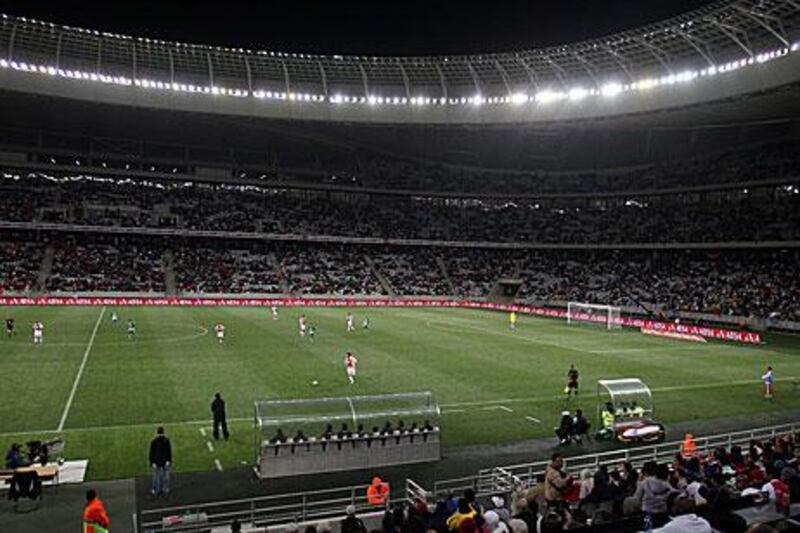You need hardly descend from cloud level over Johannesburg to remember that a year ago today, this city was the site of the most watched sporting spectacle known to man.
Impressive Al Masaood battles to third on American Le Mans Series debut
The Emirati driver and teammate Steven Kane start from the pit-lane and carve through the field from 31st to claim third at Lime Rock Park in Connecticut.
Al Salfa wins first medal for UAE at Asian championships. Read article
Sri Lankan cricket should gets its house in order first. Read article
Alonso's joy on turnaround at British Grand Prix. Read article
Pakistan's cricket coaching system is old fashioned. Read article
The very skyline defiantly refuses to forget the 2010 World Cup. Wrapped around the Hillbrow tower, the telecommunications mast almost as iconic to Jo'burg as Table Mountain is to Cape Town, there is still, three-quarters of the way up its pylon, a bulbous black and white football, some 30 metres in diameter.
Soccer City lies barely five miles away. There, last July 11, Andres Iniesta scored the goal that made Spain world champions for the first time in their history.
Some nine evenings earlier, Ghana matched Africa's finest ever showing at football's greatest showpiece by coming within a penalty shoot-out of reaching a semi-final.
Soccer City still looks stunning, its red-brown bowl exterior weathering well, yet its role in post-World Cup South Africa remains unclear, its part in the legacy of the tournament still under busy negotiation.
The arena's very name has been subject of a court case in the last 12 months. Its managers sought to have it known as The National Stadium.
A bank, FNB, reminded them they had a contract for its naming rights. The issue keys into the future of the 85,000-capacity stadium, rebuilt at a cost of US$440 million (Dh1.615m) for the World Cup.
Talks are in progress for the Golden Lions rugby union team to make the venue their new, full-time home.
Its location on the edge of Soweto would not instinctively be associated with rugby, a sport largely associated with the country's white minority, but the oval-ball matches that have taken place there have been well attended.
To have the Lions as permanent tenants would symbolise an important, positive benefit for a country still struggling with racial divisions nearly 20 years after the end of apartheid.
The Kaizer Chiefs, South Africa's most popular football club, are also being wooed as anchor tenants by Soccer City, though for the first season since the World Cup, the Chiefs have enjoyed a peripatetic existence, playing home matches in the local Premier Soccer League (PSL) at a variety of the smart grounds erected for 2010.
The Chiefs and the Orlando Pirates are the only pair of clubs who can guarantee very big crowds nationwide.
And the World Cup stadiums need bigger crowds, especially those such as Greenpoint in Cape Town that were constructed for a month of football last year without an obvious long-term purpose.
Greenpoint cost $600m. When it hosted the Cape Town derby, between Ajax Cape Town and Santos last October, only 8,000 of its 65,000 seats were occupied.
Big concerts, by the likes of U2 have filled the venue since, but football is an infrequent visitor.
Rugby is there even less, because the Cape Town Stormers, semi-finalists in the latest Super 15 competition, are content with their home at Newlands, the stadium South Africa's World Cup organisers chose not to use last year, preferring lavish expenditure on Greenpoint.
Elsewhere, the grounds at Nelson Mandela Bay, Polokwane and Nelspruit struggle to bring in large crowds regularly, and suffer for not having strong local football clubs.
What South Africa's fans have seen, though, in the first post-World Cup year, is exciting football. A broad consensus says that standards in the PSL have risen. Whether that is coincidence or inspiration, the domestic season finished with a dramatic cliffhanger, the Pirates overtaking Ajax in the table on the a last day when three clubs - the Chiefs were the other - might have clinched the league title.
Football, always the most popular sport in the country, is now being played by more people.
"The World Cup fostered greater understanding," Johan Volsteedt, the headmaster of Grey College, a school famous for producing international cricketers and rugby players, told the Johannesburg Sunday Times.
"More schools are offering soccer, and soccer has brought our students closer."
Bongani Khumalo, the South Africa defender who scored the opening goal in his country's win against France during the World Cup, said: "People generally seem to have greater respect for the game and us footballers since the World Cup. It gave us a lot of energy as a country."
Khumalo earned a transfer, last January, from the PSL's Supersport United to Tottenham Hotspur in the English Premier League partly on the back of his World Cup performances.
He has struggled for playing time in England, but his national team have thrived since becoming the only host to go out in the first round of a World Cup finals.
Now captained by Steven Pienaar, of Spurs, and coached by Pitso Mosimane, a respected former South Africa international, "Bafana Bafana" have beaten Egypt at home and drawn with the reigning African champions in Cairo in qualifying the for 2012 African Cup of Nations. There are South Africans who expected a watershed, a nation-altering effect from staging sport's greatest show. The reality is more tempered.
As the popular columnist Mondli Makhanya, wrote, wistfully: "You would be hard pressed to point to the legacy apart from the stadiums, nice infrastructure and an assertive Bafana Bafana.
"One can list dozens of other nations which used the hosting of global events to impact on their social, political and economic cultures. It is those nations in whose company we should be."






